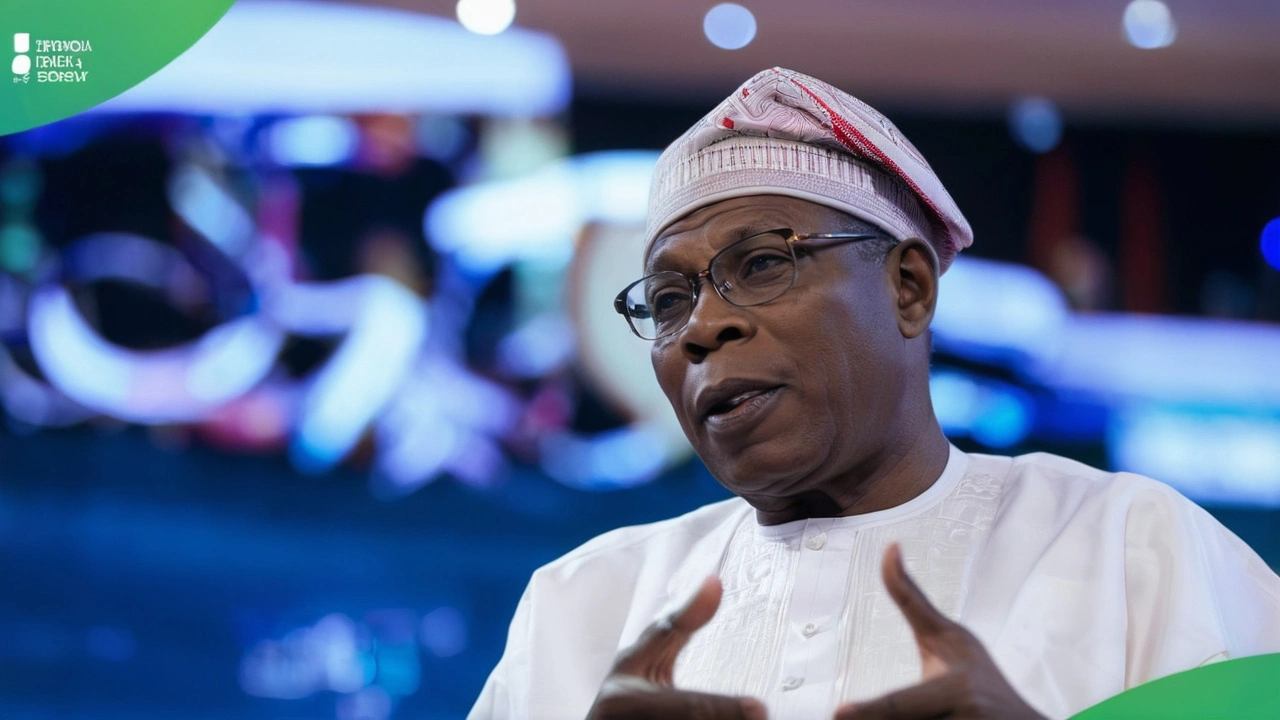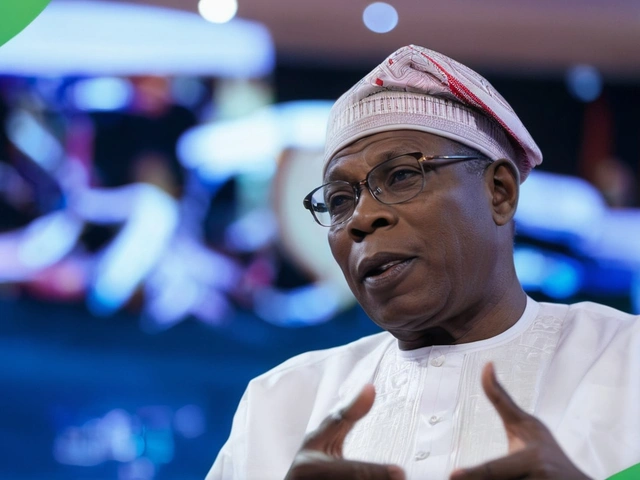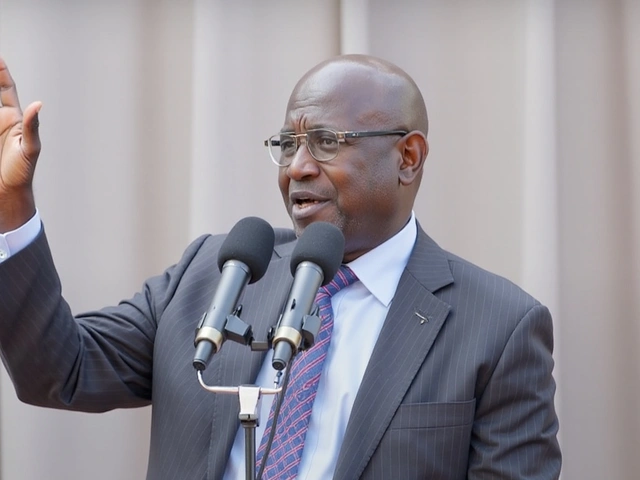Introduction
Chief Olusegun Obasanjo, a towering figure in Nigerian history, has proposed several steps aimed at steering Nigeria towards sustainable development. His extensive experience as both a military leader and a civilian president offers a unique insight into the multifaceted challenges and opportunities facing the nation. Obasanjo's recommendations come at a crucial time when the country is grappling with ethnic and religious tensions, economic instability, and the need for profound policy reforms.
Historical Context: Obasanjo's Tenure and Influence
Obasanjo's influence on Nigeria's political landscape is profound. He served as Nigeria's head of state from 1976 to 1979 and later returned as civilian president from 1999 to 2007. His tenure in both military and civilian roles has endowed him with an unparalleled understanding of the nation's dynamics. As a military ruler, he was known for his pragmatic approach to governance and his commitment to laying the groundwork for a democratic transition.
During his presidency, Obasanjo focused on reducing poverty, combating corruption, and establishing a robust democratic system. He embarked on ambitious reforms aimed at transforming the Nigerian economy and reinvigorating its institutions. Despite facing numerous challenges, his leadership was marked by a concerted effort to improve governance and strengthen Nigeria's standing on the international stage.
The Crucial Steps Proposed for Nigeria's Development
Obasanjo's vision for Nigeria's development encompasses a range of critical areas that need immediate and sustained attention. He emphasizes the importance of addressing ethnic and religious tensions that have long been a source of division and conflict in the country. According to Obasanjo, fostering national unity and promoting inclusive governance are essential for creating a stable and prosperous Nigeria.
On the economic front, Obasanjo advocates for comprehensive policy reforms aimed at stimulating growth and reducing inequality. He underscores the need for a diversified economy that is not overly reliant on oil revenues. Investing in critical sectors such as agriculture, manufacturing, and technology can drive sustainable development and create job opportunities for the burgeoning youth population.
Another key area highlighted by Obasanjo is the enhancement of educational and healthcare systems. He points out that a well-educated and healthy population is fundamental to the country's long-term development. Strengthening these sectors through adequate funding, effective policies, and innovative solutions is crucial for building a resilient and dynamic society.
Reflecting on Past Experiences and Lessons Learned
Obasanjo's perspectives are deeply informed by his own experiences during some of the most tumultuous periods in Nigeria's history. Notably, his role as a military commander during the Nigerian Civil War, where he led a division at the Biafran front, provided him with firsthand insight into the devastating impact of conflict and the importance of reconciliation and peacebuilding.
His later imprisonment from 1995 to 1998 under General Sani Abacha's regime further shaped his views on governance and human rights. After his release following Abacha's death, Obasanjo's subsequent election as president in 1999 (the first transition from military to civilian rule in decades) marked a significant milestone in Nigeria's democratic journey. His presidency was characterized by efforts to reform the military, curb corruption, and promote transparency.
International Contributions and Legacy
Beyond Nigeria, Obasanjo's contributions to international relations and global diplomacy have earned him respect as a prominent African statesman. His roles in various United Nations initiatives and other international organizations have highlighted his commitment to peace, security, and development on the continent and beyond.
While his presidency was not without controversies, including criticism over attempts to extend his term, Obasanjo's legacy is largely defined by his dedication to improving governance and fostering development. His efforts in transferring power to civilian governments, particularly after years of military rule, stand as a testament to his commitment to democratic principles.
The Way Forward: Implementing Obasanjo's Recommendations
To fully realize the potential of Obasanjo's vision for Nigeria, it is imperative for current and future leaders to take his recommendations seriously. Addressing the deep-rooted ethnic and religious divisions requires political will and a commitment to inclusive governance. Promoting dialogue and understanding among different communities can help build a cohesive and united nation.
Economic diversification is another critical aspect that should be pursued with vigor. Reducing dependency on oil by investing in agriculture, technology, and other viable sectors can create a more resilient and sustainable economy. Policies that promote innovation, entrepreneurship, and infrastructure development will be key drivers of this transformation.
Finally, enhancing education and healthcare must remain a top priority. Allocating sufficient resources and leveraging technology can significantly improve the quality and accessibility of these essential services. Empowering the youth through education and ensuring a healthy population will lay a strong foundation for Nigeria's future growth and development.
Conclusion
Chief Olusegun Obasanjo's insights and recommendations offer a comprehensive roadmap for Nigeria's development. His emphasis on unity, economic diversification, education, and healthcare underscores the multifaceted approach needed to address the country's challenges. As Nigeria continues its journey towards sustainable development, the implementation of these key steps will be crucial in creating a more prosperous, equitable, and stable nation. Obasanjo's enduring legacy as a military and civilian leader, combined with his international contributions, positions him as a pivotal figure whose vision can guide Nigeria towards a brighter future.




Comments
Great to see Obasanjo's focus on unity and growth! :)
The strategic framework outlined by Obasanjo reflects a comprehensive approach to macro‑economic stabilization, institutional capacity‑building, and human capital development. It emphasizes diversification away from hydrocarbon dependency, advocating for an agro‑industrial nexus that can leverage Nigeria's arable land base. By promoting technology transfer and fostering an innovation ecosystem, the plan aims to catalyze value‑added manufacturing. Moreover, the emphasis on fiscal prudence, coupled with debt‑management reforms, seeks to enhance macro‑financial resilience. Robust governance mechanisms, including anti‑corruption safeguards, are positioned as critical enablers of policy efficacy. The proposal to strengthen the health sector through public‑private partnerships aligns with global best practices in health systems strengthening. Educational reforms, particularly in STEM curricula, are intended to produce a future‑ready workforce. Infrastructure investment, especially in power and logistics, is identified as a linchpin for economic competitiveness. The narrative also calls for inclusive governance structures that mitigate ethnic and religious fragmentation. By institutionalizing dialogue platforms, the blueprint aspires to embed social cohesion into policy cycles. These initiatives, collectively, could improve Nigeria's credit rating and attract foreign direct investment. The recommendation to harness digital finance platforms reflects an understanding of fintech's disruptive potential. Simultaneously, the focus on agribusiness value chains aims to reduce post‑harvest losses and boost export earnings. The health agenda underscores preventive care, aiming to lower morbidity and enhance labor productivity. Finally, the vision integrates climate‑smart agriculture to ensure environmental sustainability while driving growth. In sum, the multi‑pronged strategy presents a roadmap that, if executed with political will, could reposition Nigeria on the development trajectory.
One cannot ignore the moral imperative to prioritize education over short‑term political gain. It is disheartening when leaders neglect this responsibility.
Love how the plan puts youth empowerment front and center. It really shows a compassionate outlook :)
Investing in tech hubs could be a game‑changer for job creation.
Thinking about the long‑run, a balanced approach that mixes economic diversification with social equity is essential. The vision invites us to reflect on our shared future.
Honestly, the emphasis on inclusive governance, the need for diversified agriculture, the push for tech‑driven education, the call for health system reforms, the strategy for infrastructure upgrades, the focus on fiscal responsibility, the vision for reducing ethnic tensions, the blueprint for attracting foreign investment, the framework for anti‑corruption measures, the roadmap for renewable energy, the agenda for youth empowerment, the plan for strengthening judicial independence, the proposal for decentralizing power, the outline for climate resilience, all of it sounds incredibly promising, provided there is genuine political will.
Obasanjo’s ideas could spark real change if we all stay optimistic.
From a nationalist standpoint, leveraging our oil wealth to fund diversification is non‑negotiable; without that capital base, the entire agenda collapses.
Yo, this is the kind of roadmap we need – straight talk, real actions, and big dreams for the next generation.
It’s refreshing to see a leader who blends philosophical depth with practical optimism, even if some points feel a bit idealistic.
Nice overview, looks solid.
Yo bro, this whole thing sounds like textbook fluff – real Nigeria needs gritty action, not just fancy words. Gotta hustle!
Seems like a decent plan, though I’m not convinced it’ll survive the political circus.
Let’s be honest, any proposal that doesn’t put the nation’s sovereignty first is just a Western ploy, and this one is no exception.
Interesting take, but I wonder if the emphasis on foreign investment isn’t inadvertently sidelining local entrepreneurs, especially given the current economic climate.
While the narrative is undeniably polished, one must ask whether the proposed reforms adequately address the deep‑rooted systemic corruption that has long plagued the nation. The emphasis on top‑down directives often overlooks grassroots realities, creating a disconnect between policy intent and implementation reality. Moreover, the reliance on external expertise risks marginalizing indigenous solutions that have evolved organically over decades. In short, the vision, though commendable, may be compromised by an over‑reliance on technocratic paradigms that fail to capture the lived experiences of ordinary Nigerians.
From an inquisitive standpoint, I’m curious how the agricultural diversification will handle climate variability, especially in the Sahelian zones.
🧐 The proposal’s health sector reforms sound promising, yet without robust data analytics, measuring impact will remain a challenge.
Yo, the whole thing feels like a buzzword soup, but if someone actually boots up the plan, maybe we’ll see something real.